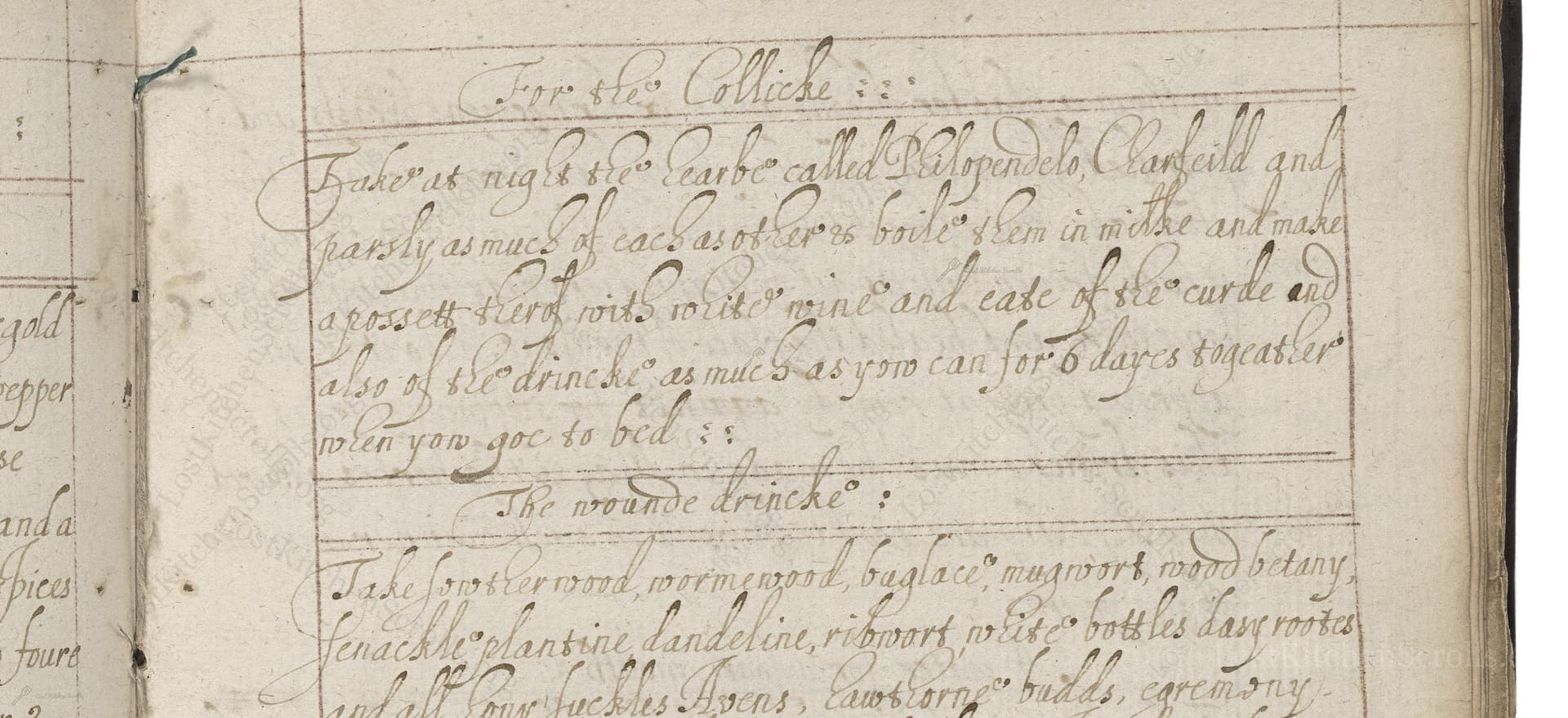For The Collicke
From the treasured pages of Medicinal and cookery recipes by John King
Written by John King

For The Collicke
"Take at night the hearbe called Philopendelo, Clarckfeild and parsly as much of each as other & boile them in milke and make a possett stered with white wine and ease of the curde and also of the drincke as much as you can for 6 dayes togeather when you goe to bed ::"
Note on the Original Text
The recipe employs a direct, instructive style typical of manuscript household receipts from the early modern period. Spelling is inconsistent—'Philopendelo' is an early variant for Filipendula (meadowsweet), and 'Clarckfeild' likely refers to a local or now-obsolete herb name. Directions are brief, presuming familiarity with terms like 'possett' and 'easing the curd' (removing the curds after curdling with wine). Quantities are left vague, reflecting the oral traditions and domestic scale at which such recipes were commonly used.

Title
Medicinal and cookery recipes by John King (1675)
You can also click the book image above to peruse the original tome
Writer
John King
Era
1675
Publisher
Unknown
Background
A delightful journey into the kitchens of the 17th and early 18th centuries, this collection, attributed to John King, brims with time-honored recipes, culinary wisdom, and flavors that once graced historic tables.
Kindly made available by
Folger Shakespeare Library
This recipe originates from the manuscript V.a.490, compiled by John King and associates between roughly 1625 and 1725, a time when household remedies were common across Europe and often handed down through families. Medicinal recipes from this era reflect a blend of folk wisdom and early medical theory, long before products were regulated or synthesized in laboratories. The posset was a widely understood domestic remedy—essentially a hot milk punch, curdled with wine or ale and often combined with herbs considered beneficial for certain ailments. The drink was believed to soothe digestive distress such as 'collicke', an old term for abdominal pain or colic.

In the early 17th to 18th centuries, preparing this remedy would involve simple kitchenware: a cauldron or pot for boiling milk, a hearth or open fire for heating, a knife for chopping herbs, and a linen cloth or fine strainer for separating curds from whey. A posset pot (a lidded jug with a spout, used for serving curdled milk drinks) might be used if available, but a sturdy bowl would suffice in its absence.
Prep Time
5 mins
Cook Time
10 mins
Servings
1
We've done our best to adapt this historical recipe for modern kitchens, but some details may still need refinement. We warmly welcome feedback from fellow cooks and culinary historians — your insights support the entire community!
Ingredients
- 1/2 ounce fresh parsley (Petroselinum crispum)
- 1/2 ounce fresh meadowsweet (Filipendula ulmaria) or substitute with dried meadowsweet, or omit if unavailable
- 1/2 ounce fresh chamomile flowers (optional substitute for 'clarckfeild')
- 2 cups whole milk
- 1/3 cup dry white wine
Instructions
- Begin by gathering fresh parsley (Petroselinum crispum) and, if available, meadowsweet (Filipendula ulmaria), which likely corresponds to the 'Philopendelo' mentioned in the text.
- 'Clarckfeild' seems to be a historic name not found in modern herbals—if unavailable, simply omit or substitute with another mild, soothing herb such as chamomile.
- Take roughly equal parts of each herb, about 1/2 ounce per herb per serving.
- Boil 2 cups of whole milk in a saucepan with the herbs for about 10 minutes, until the flavors are well infused.
- In a separate pan, heat 1/3 cup of dry white wine just to warm.
- Once the milk is ready, strain out the herbs.
- Combine the hot milk with the wine in a heat-resistant bowl—this will cause the milk to curdle, creating a posset (a classic early-modern remedy and drink).
- Stir to mix and allow to settle for a few minutes.
- Carefully remove and discard the curds (curdled milk solids), then drink as much of the liquid (the whey) as you can tolerate before bed.
- Repeat this process for six nights.
- Recipe serves one.
Estimated Calories
120 per serving
Cooking Estimates
You will need about 5 minutes to gather and prepare the herbs. Cooking and infusing the herbs in milk will take an additional 10 minutes. Each serving, after removing the curds, has about 120 calories from the milk and wine. This recipe makes enough for one serving.
As noted above, we have made our best effort to translate and adapt this historical recipe for modern kitchens, taking into account ingredients nowadays, cooking techniques, measurements, and so on. However, historical recipes often contain assumptions that require interpretation.
We'd love for anyone to help improve these adaptations. Community contributions are highly welcome. If you have suggestions, corrections, or cooking tips based on your experience with this recipe, please share them below.
Join the Discussion
Rate This Recipe
Dietary Preference
Main Ingredients
Culinary Technique
Occasions

Den Bockfisch In Einer Fleisch Suppen Zu Kochen
This recipe hails from a German manuscript cookbook compiled in 1696, a time whe...

Die Grieß Nudlen Zumachen
This recipe comes from a rather mysterious manuscript cookbook, penned anonymous...

Ein Boudain
This recipe comes from an anonymous German-language manuscript cookbook from 169...

Ein Gesaltzen Citroni
This recipe, dating from 1696, comes from an extensive anonymous German cookbook...
Browse our complete collection of time-honored recipes



